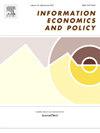“I don't care about cookies!” data disclosure and time-inconsistent users
IF 3.2
3区 经济学
Q1 ECONOMICS
引用次数: 0
Abstract
Time-inconsistent internet users neglect future privacy costs and release too much data to digital firms. We study how regulation that requires user consent for data processing affects firm profits, user surplus, and welfare, depending on the degree of time inconsistency and on firms' business models. If the firm appropriates sufficiently high profits from data, consent mechanisms increase welfare only if their design facilitates consent refusal and time inconsistency is neither too high nor too low. If firms can make it difficult to opt out, it may be better for society to let the former choose the disclosure level. However, consent policies increase user surplus when time inconsistency is high. Voluntary caps on usage can raise profits by making some users disclose more data.
"我不在乎 cookie!"数据披露和时间不一致的用户
时间不一致的互联网用户会忽视未来的隐私成本,并向数字公司释放过多数据。我们研究了要求用户同意数据处理的法规如何影响企业利润、用户剩余和福利,这取决于时间不一致的程度和企业的商业模式。如果企业从数据中获取了足够高的利润,那么只有在同意机制的设计有利于拒绝同意且时间不一致性不高也不低的情况下,同意机制才会增加福利。如果企业能让用户难以选择退出,那么让前者选择披露水平可能对社会更好。然而,当时间不一致程度较高时,同意政策会增加用户盈余。使用量的自愿上限会让一些用户披露更多数据,从而提高利润。
本文章由计算机程序翻译,如有差异,请以英文原文为准。
求助全文
约1分钟内获得全文
求助全文
来源期刊

Information Economics and Policy
ECONOMICS-
CiteScore
5.00
自引率
10.70%
发文量
27
期刊介绍:
IEP is an international journal that aims to publish peer-reviewed policy-oriented research about the production, distribution and use of information, including these subjects: the economics of the telecommunications, mass media, and other information industries, the economics of innovation and intellectual property, the role of information in economic development, and the role of information and information technology in the functioning of markets. The purpose of the journal is to provide an interdisciplinary and international forum for theoretical and empirical research that addresses the needs of other researchers, government, and professionals who are involved in the policy-making process. IEP publishes research papers, short contributions, and surveys.
 求助内容:
求助内容: 应助结果提醒方式:
应助结果提醒方式:


